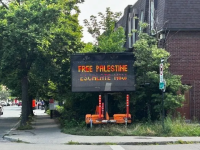Haredi burqa sect
The "Haredi burqa sect" (Hebrew: נשות השָאלִים Neshót haShalím, lit. 'shawl-wearing women') is a community of Haredi Jews that ordains the full covering of a woman's entire body and face, including her eyes, for the preservation of modesty (tzniut) in public. In effect, the community asserts that a Jewish woman must not expose her bare skin to anyone but her husband and immediate family. The garment in question, known as a shal (שָאל, lit. 'shawl'), is also referred to as a frumka—a portmanteau of the Yiddish-language word frum and the Arabic-language word burqa. The Haredi burqa sect, with an estimated population of several hundred people as of 2011, is primarily concentrated in Israel, and particularly in the Israeli city of Beit Shemesh. These Haredim rarely leave their homes; the married women who do come out in public are accompanied by their daughters, who also don long robes.
Woman of the Haredi burqa sect in Mea Shearim, a Jewish neighbourhood in Jerusalem, 2012
In both Israel and the Jewish diaspora, the Haredi burqa sect is controversial, even among the broader Haredi community itself. Several notable Haredi religious organizations, including the Jerusalem-based Edah HaChareidis, have issued strong and vocal statements condemning the burqa sect's radical tenets with regard to women's clothing.
The "Haredi burqa sect" (Hebrew: נשות השָאלִים Neshót haShalím, lit. 'shawl-wearing women') is a community of Haredi Jews that ordains the full covering of a woman's entire body and face, including her eyes, for the preservation of modesty (tzniut) in public. In effect, the community asserts that a Jewish woman must not expose her bare skin to anyone but her husband and immediate family. The garment in question, known as a shal (שָאל, lit. 'shawl'), is also referred to as a frumka—a portmanteau of the Yiddish-language word frum and the Arabic-language word burqa. The Haredi burqa sect, with an estimated population of several hundred people as of 2011, is primarily concentrated in Israel, and particularly in the Israeli city of Beit Shemesh. These Haredim rarely leave their homes; the married women who do come out in public are accompanied by their daughters, who also don long robes.
Woman of the Haredi burqa sect in Mea Shearim, a Jewish neighbourhood in Jerusalem, 2012
In both Israel and the Jewish diaspora, the Haredi burqa sect is controversial, even among the broader Haredi community itself. Several notable Haredi religious organizations, including the Jerusalem-based Edah HaChareidis, have issued strong and vocal statements condemning the burqa sect's radical tenets with regard to women's clothing.














